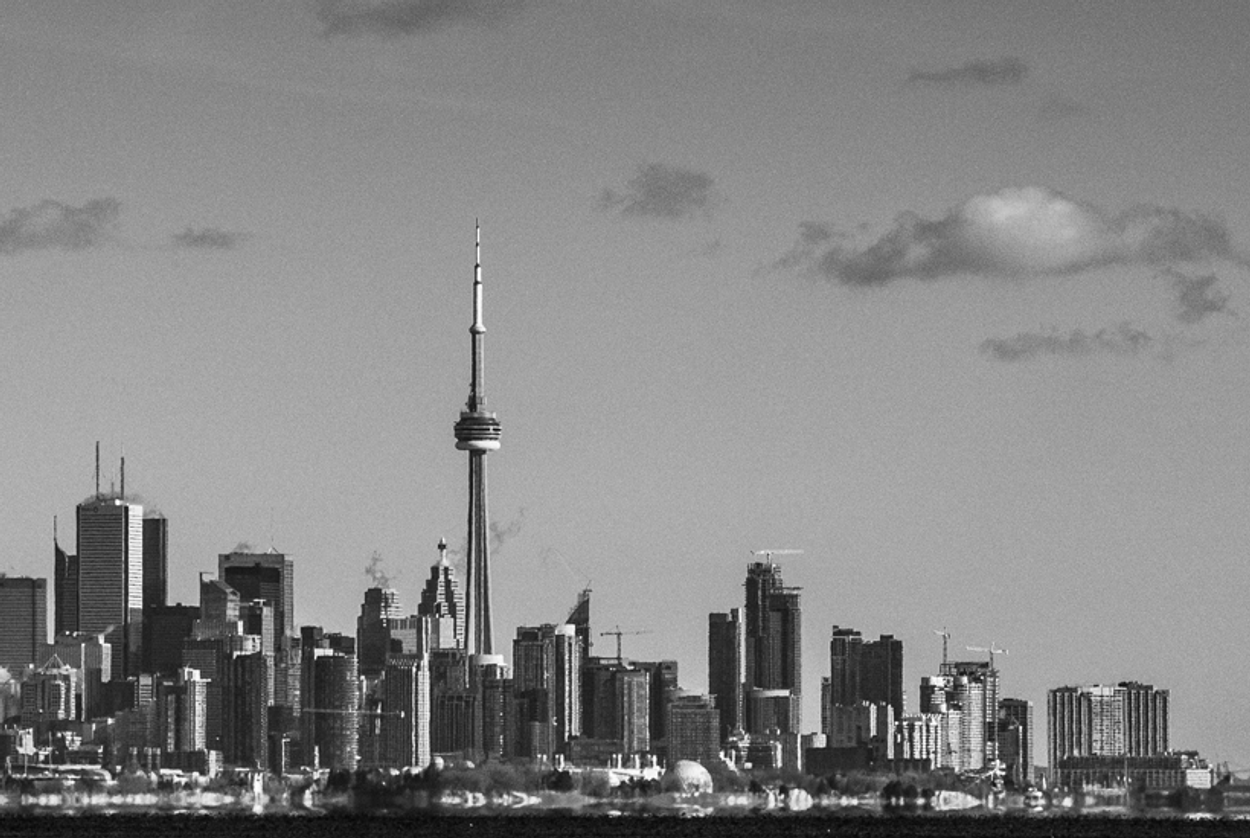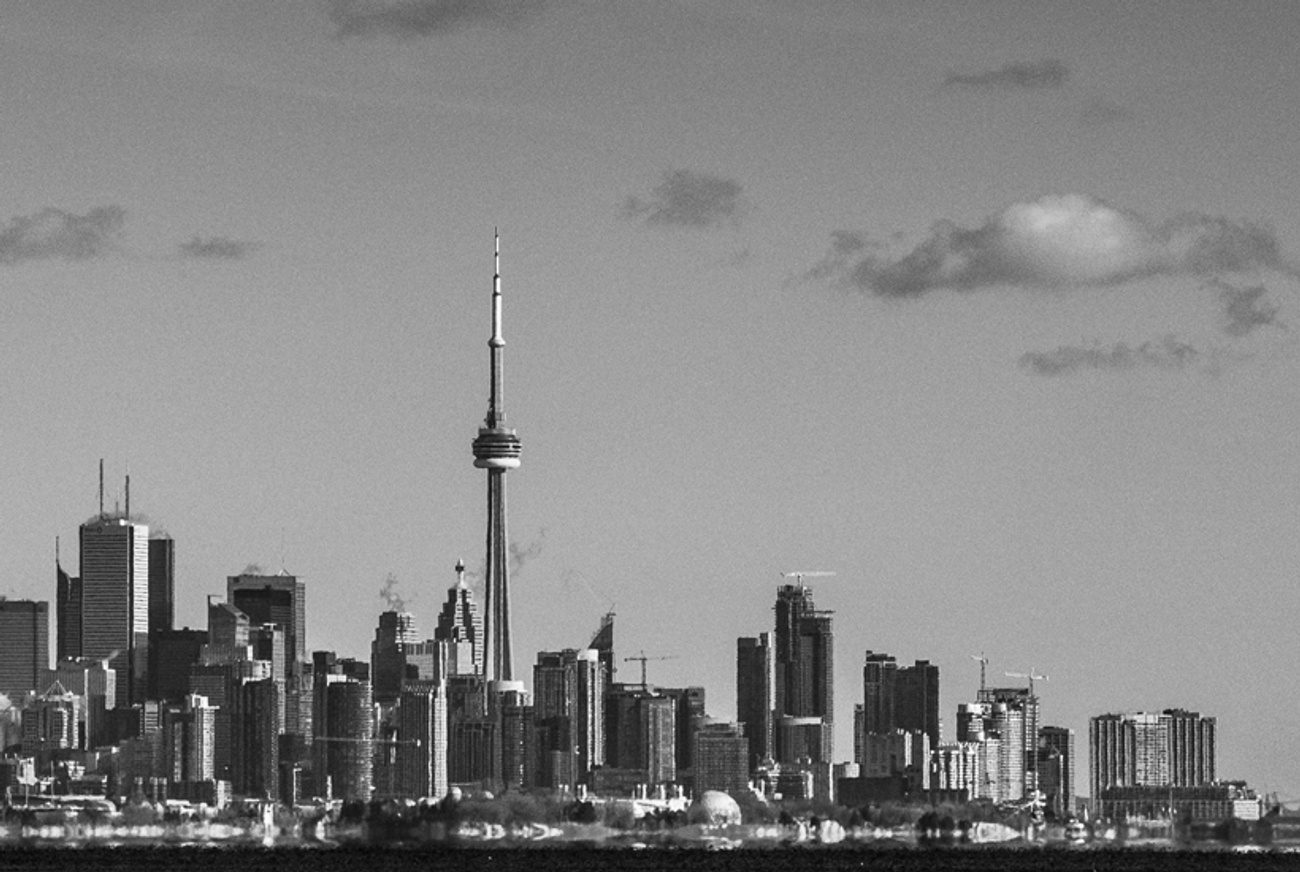I Grew Up in Toronto, but You Can’t Tell From My Accent
I don’t talk like my fellow Torontonians because I was raised inside the ‘Bathurst Bubble,’ the city’s Jewish community




I closed my eyes as I listened to the speaker at a conference in Oxford. I was jetlagged, and I knew next to nothing about Swinburne’s use of classical meter, and I wasn’t sure I cared to learn about it. But I wasn’t sleeping; I was simply turning off one sense to deepen another. I was enjoying the sound of the speaker’s voice: clear, mellifluous, with an accent I couldn’t quite identify—vaguely foreign, vaguely familiar. Irish, perhaps, after a long sojourn in the United States? When I heard the applause, I opened my eyes to see the speaker sit down beside me. I leaned over and asked her where she was from. “Toronto,” she replied. “And you?”
Growing up in Toronto, I had been confined to what’s called the “Bathurst Bubble,” a passage of the city that runs from Bloor Street—where my mom first arrived, post-Holocaust, and which is now witnessing a Jewish renaissance, full of young families who send their kids to local Jewish preschools—to north, way north on Bathurst Street, to the developments in Thornhill Woods beyond the city’s borders. Drive up this long and painfully slow road and you will find one JCC and later another, shuls and Jewish day schools, Federation offices, Hadassah-WIZO offices, Israel’s Judaica store, and clusters of Hasidim. The eateries include Grodzinksi Bakery, Tov-Li Pizza, and Milk’n’Honey dairy restaurant; there’s Gryfe’s Bagel Bakery and What-a-Bagel and Kiva’s Bagel Bakery, although none is quite as good as Haymishe Bagel Shop, which recently burned down. For those of us who lived and played and went to school along this kosher corridor, this is our Toronto. We left it occasionally—winter break in Miami Beach, B’nai Brith camp a few hours up north, March of the Living in Poland and Israel—but to the Bubble we always returned. This was our shtetl.
But inside the Bubble, we didn’t sound like everyone else in Toronto outside the Bubble.
The first time I discovered that I don’t speak the way my cityfolk do was across the border almost 20 years ago.
In the United States, I was exposed to a variety of accents—including those of “real” Torontonians. “Isn’t it so funny how they say certain words?” one of these “real” Torontonians asked me about Americans; she was from Cabbagetown, well outside of the Bubble. “Yes,” I agreed, uncertainly. “Like what?”
“Oh, you know how they say agehnst and bin.”
“Right,” I said. “And we say—?”
“We say agaynst. And bean. You know, like ‘I’ve bean wondering if I should hold agaynst these Americans that they talk so funny!’ ”
I smiled weakly. Of course we do. I had bean thinking that at all long. Except that I hadn’t been.
My inability to detect the tones of my own hometown is not new. But at least it’s mutual. Immediately following my conference at Oxford (about a sassy Progressive-Era Jewish writer no one had ever heard of), I boarded a train and headed to another academic conference, this one in Nottingham, about the cross-border cultural meanderings of Canadians. Naturally, almost everyone at the conference was Canadian (who else would be interested in a conference about Canadians?). I presented my paper on films of the borscht belt (which I transnationalized to include the Laurentians), and here I found the tables were turned. I spoke, and immediately afterward a woman approached me and asked me what my fabulous accent was. “I’m from Toronto,” I said. But that wasn’t the right answer. “No, no, I’m from Toronto,” she said. “Where else?”
“Well, I live in Princeton,” I said. “And before that, Edmonton. And before that, New York—”
Before I could finish reeling off the places I had made my home over the course of my peripatetic academic career, she found her answer. “Yes! That’s it! You sound like you’re from New York!” she said. “I’ve never bean to New York, but I’m sure that’s it!”
In all honesty, I do not sound like I’m from New York. I might not say agaynst and bean, but neither do I say Flahrida or cawffee. Though I suppose New York doesn’t really mean New York. It means I sound Jewish. Which is to say, I don’t sound like a “real” Torontonian.
Surely there is an irony in the idea of there being a “Toronto accent,” since Toronto is amazingly diverse; half of the Greater Toronto Area’s 6 million residents were born outside the country. Pakistani and Iranian and Italian accents can be heard on the streets of Scarborough and Etobicoke and North York, and within these accents histories of the world can be heard. My dad has an Arabic-tinged Israeli accent. My grandmother had a Volhynian Yiddish accent. But me? I was born and raised in Toronto and speak no other language as fluently and comfortably as the English I thought was native to the city. I spoke the same English as my Canadian-born teachers and peers at my elementary and high school. Then again, I went to a Jewish elementary school and a Jewish high school inside the Bubble; all of us were Jewish, and none of us had a “Toronto accent.”
The truth is, I’ve always thought that I stood apart from “real” Torontonians because of how I look, not how I sound. Like many ethnically or racially ambiguous people, I’ve been subject to a lifetime of “But where are you really from?” I’ve always assumed this to be a question about my Mediterranean-ish features, and usually it is. I finally met my across-the-street neighbor of two years recently, and she described pre-meeting me as “wondering about the dark lady on the street,” a sentiment echoed by a professor at the Nottingham conference who said she wanted to introduce herself to the “pretty dark girl with the great question.” I famously have a dearth of mirrors in my house, but I guess I can conclude that when people see me, my coloring is what stands out most. One summer, I brought a little Korean boy I was tutoring in North Carolina to tears three times in three weeks. He kept asking me where I was from, and I kept telling him Toronto. The first time, I simply named my hometown. The second time, I showed him the city on the map, pointing to it, pointing to me. He felt—as his father later explained to me—he was learning no English at all if he couldn’t make his simple question understood. So, he asked a third time, and devastated by the sight of his eyes desperately trying to blink away tears yet again, I asked him why I couldn’t be from Toronto. He ran out of the room and returned with a sheet of white paper pulled off the printer. He held it up to my face. “Canada People!” he announced. Then he put his forearm beside mine. “Same,” he said. “No Canada People.”
Of course, inside the Bathurst Bubble, no one has ever asked if I’m Spanish or Italian or Greek or told me my skin looks Korean. During one of the many lousy jobs of my youth as a hostess at an upscale pool hall within the limits of the Bathurst Bubble, a guy started bageling me in hopes of getting a table earlier (perhaps he didn’t realize everyone in the room could have bageled me as easily). Bored by his attempt, I interrupted: “How did you know I’m Jewish?” His eyes bugged out a little. “You might as well have a yellow star sewn on your blouse,” he replied.
So, it’s obvious from the way I look. And, it turns out, from the way I sound. So, the next time someone asks where I’m from, I think I’ll just give them the answer they’re looking for: Jewlandia.
***
Like this article? Sign up for our Daily Digest to get Tablet Magazine’s new content in your inbox each morning.
Karen E. H. Skinazi, PhD, is a cultural and literary critic, and author of the forthcoming book, Women of Valor: Orthodox Jewish Troll Fighters, Crime Writers, and Rock Stars in Contemporary Literature and Culture.
Karen E. H. Skinazi, PhD, is a cultural and literary critic, and author of the forthcoming book, Women of Valor: Orthodox Jewish Troll Fighters, Crime Writers, and Rock Stars in Contemporary Literature and Culture.